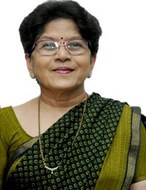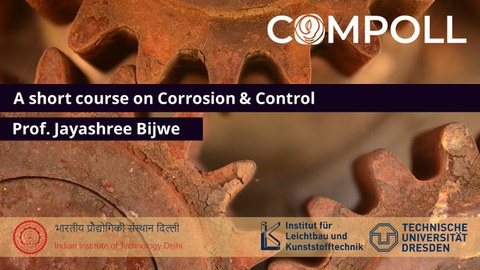COMPOLL Teaching, winter semester 2023/24 - "Corrosion & Control"
In the winter semester 2023/24, a COMPOLL block course on Corrosion & Control by Prof. Jayashree Bijwe will be held at ILK.
The short course is mainly designed to make engineers understand corrosion, its disastrous effects, why metals corrode, how galvanic couple and current are formed, which metal will preferentially corrode, at which location it will corrode, and controlling techniques. The course content is divided into three modules (Theory & Case studies):
- Fundamentals-Principles
- Types of Corrosion
- Corrosion Control
COURSE INSTRUCTOR
Prof. Jayashree Bijwe is a retired faculty at the CART (Centre for Automotive Research & Tribology), Indian Institute of Technology Delhi, India. She worked for 27 years as a faculty. She was the first one to collaborate for a long term with ILK, Dresden.
Her research interests were in developing high-performance polymer composites for enhanced structural & tribo-performance (dry bearings, eco-friendly brake pads, high-temperature adhesives); and nano-oils for engines, gears, and bearings. She has worked with foreign and Indian Industries and collaborated for a long time with two German and two French Universities. She has published 250 research papers in International journals with more than 10,000 citations, her h index (google scholar) is 57. She has received the prestigious Faculty Lifetime Research Award from I. I. T. Delhi, in 2021, and Research.com, has ranked 46 among the top 50 scientists in India and 4785 in World in Material Science in 2022.
 © Bijwe
© Bijwe
Seniorprofessor at the CART / ITMMEC
NameMs Prof. Dr. Jayashree Bijwe
Indian Institute of Technology Delhi:
CART (Centre for Automotive Research & Tribology), formerly Industrial Tribology Machine Dynamics & Maintenance Engineering Centre (ITMMEC) IIT Delhi Campus, Hauz Khas
110016 New Delhi
Indien
COURSE CONTENT
- Importance of corrosion control in industrial practices, Thermodynamics of corrosion.
- Broad forms of corrosion – uniform, uneven, pitting, cracking (SSC), etc. & influencing factors Surface film, Polarisation, passivity.
- Various types of corrosion along with case studies– Galvanic, Thermogalvanic, Intergranular, Pitting, Selective attack (leaching), Stress corrosion cracking, and hydrogen embrittlement.
- Corrosion evaluation and monitoring.
- Corrosion Control-Design improvement, Selection of material, Role of residual stress, Changes in operating conditions, Use of inhibitors, Anodic and Cathodic protection, Corrosion resistant coatings
EXPECTED LEARNING OUTCOMES
The course is mainly designed to make engineers understand corrosion, its disastrous effects, why metals corrode, how galvanic couple and current are formed, which metal will preferentially corrode, at which location it will corrode, and controlling techniques. There are no mathematical equations/derivations involved.
At the end of the course, the student will be able to understand,
- why corrosion takes place, which metal will corrode and why and where
- Quantification of the extent of corrosion and corrosion current density
- Simple methods to control it.
METHODOLOGY
The course will be delivered in the form of lectures through PowerPoint presentations. In the end, students will be evaluated through a quiz based on the topics covered.
SCHEDULE
| Wednesday, October 4th, 2023 | ||
| 9:20 - 10:50 | Introduction, the impact of corrosion on the environment, energy, material, economics & GNP |
|
| 11:10 - 12:40 | Understanding the principles of corrosion | |
| 13:00 - 14:30 | Essential conditions for corrosion, Generation of corrosion current & factors affecting |
|
|
14:50 – 16:20 |
Types of corrosion cells Galvanic series to decide anodes & cathodes |
|
| Thursday, October 5th, 2023 | ||
| 9:20 - 10:50 | The surface film, Polarisation, passivity | |
| 11:10 - 12:40 | Forms of corrosion | |
| 13:00 - 14:30 | Corrosion evaluation & monitoring | |
|
14:50 – 16:20 |
Corrosion controlling techniques | |
| Tuesday, October 10th, 2023 | ||
| 9:20 - 10:50 | Corrosion controlling techniques - Continued | |
| 11:10 - 12:40 | Summing up & quiz | |
ROOM
ILK, TU Dresden, Holbeinstraße 3, 01307 Dresden - DÜR 255
COURSE LANGUAGE
English
SCOPE
2 SWS, 2 ECTS

